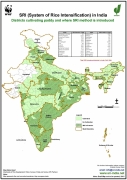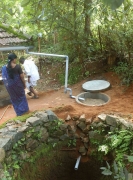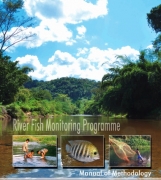/topics/governance
Governance
System of Rice Intensification and Paddy Cultivation - Maps developed by the WWF-ICRISAT Project
Posted on 14 Jun, 2010 06:23 PM Paddy, one the country's staple crops is cultivated all over the country, barring parts of Jammu and Kashmir, Gujarat and Rajasthan. This set of interesting maps about Paddy and System of Rice Intensification (SRI) from the SRI India website, maintained by the WWF-ICRISAT Project (a joint initiative of WWF and ICRISAT), give a bird's eye view of the districts under Paddy and SRI Paddy cultivation, and the Paddy productivity in various districts of the country.
Paddy, one the country's staple crops is cultivated all over the country, barring parts of Jammu and Kashmir, Gujarat and Rajasthan. This set of interesting maps about Paddy and System of Rice Intensification (SRI) from the SRI India website, maintained by the WWF-ICRISAT Project (a joint initiative of WWF and ICRISAT), give a bird's eye view of the districts under Paddy and SRI Paddy cultivation, and the Paddy productivity in various districts of the country.
Districts with Paddy cultivation and where SRI approach has been introduced: Of the total 604 districts in India, paddy is cultivated in 564 districts. Of these, in 246 districts, SRI paddy cultivation approach has been introduced (data as of 2010). The spread of SRI has been most widespread in Uttarakhand, Eastern Madhya Pradesh, Orissa, Jharkhand, West Bengal, Andhra Pradesh, Tamil Nadu and Karnataka, as 50-95% of the districts in these regions/states have presence of SRI.
Love for green: Healing the hills with trees - Work of Sachidanand Bharti in Uttarakhand (Video)
Posted on 12 Jun, 2010 12:01 PMLove for green: Healing the hills with trees - Work of Sachidanand Bharti in Uttarakhand
From Tubaah (NDTV Network) website (November 26, 2008).
Sachidanand Bharti is known as the treeman in Uttarakhand, where he has been dedicatedly planting trees since the last 25 years. Hills in Uttarakhand were once barren, but now they are lush green, all due to his efforts. Bharti is a school teacher by profession but his real calling is as a climate crusader.

Irrigation management transfer in India: The processes and constraints - Paper by IRAP
Posted on 10 Jun, 2010 07:12 PMThe paper discusses the evolution of Participatory Irrigation Management (PIM) in India, following the felt need for better irrigation management to prevent water scarcity in many regions in the country.
The irrigation sector was identified as a priority area in the various policy reforms that took place in the water sector in the country.These reforms emphasised the importance of involving end users/farmers in the operation and management of irrigation conveyance systems.
This led to the establishment of the Farmers Managed Irrigation Systems (FAMIS), which aimed at improving the overall efficiency of the irrigation system, generate a sense of ownership among farmers and to improve the irrigation revenue recovery rate. This laid the seeds for Participatory Irrigation Management (PIM) in India.
Activists from the Climate Revolution dig out climate policy gaps through the Right to Information Act
Posted on 10 Jun, 2010 07:27 AM Content Courtesy: AlertNet
Content Courtesy: AlertNet
Activists from the Climate Revolution initiative in India have discovered a crucial tool in their battle to hold the government accountable on its climate policies: the country's landmark Right to Information (RTI) Act.
Read more about Climate Revolution's work on RTI on their website here.
Irrigation water management for food security in India: The forgotten realities - Paper by IRAP
Posted on 09 Jun, 2010 06:14 PMIn this paper, the authors examine the current debates around India's water crisis and its implications for food security in the country. The paper takes a critical look at the recent official assessments of groundwater exploitation in India in the context of these debates.
The paper proposes that there is a need to make a qualitative assessment of the magnitude of food security and water management challenges facing the country. It argues that two important factors drive the agricultural growth and food production in India. These include access and availability of arable land and water resources, which need to be examined and analysed with particular reference to their regional variations, to get a true understanding of the situation.
Draft of “The Dam Safety Bill, 2010” approved
Posted on 08 Jun, 2010 06:24 PMAs per the Press Information Bureau's press release, the Union Cabinet has approved the proposal of the Ministry of Water Resources for enacting The Dam Safety Bill, on May 13 2010. The Bill is to be introduced in the Parliament.
The main objectives of the legislation are:-
• The new legislation will help the States in adopting uniform dam safety procedures which shall ensure safety of dams and safeguard benefits from such dams.
Dams on Himalayan rivers: How good is the science?
Posted on 08 Jun, 2010 05:38 PMThis brief article by Prof Jayanta Bandyopadhyay in the May 16-31 2010 issue of Business Economics magazine, highlights the recent plans of the central and state goverments of constructing a large number of dams on Himalayan rivers. Environmentalists continue to consistently argue against the construction of dams that are built without respect for ecological sciences and warn that this could lead to increase in disasters in the fragile Himalayan region.
Mazhapolima Participatory Well Recharge Programme - Concept Note and Process Document (2009)
Posted on 07 Jun, 2010 07:27 PM Mazhapolima is a community based well recharge programme, initiated by the Thrissur District Administration in collaboration with the Panchayat Raj Institutions in the District, and implemented by networking NGOs/CBOs, households, departments and agencies, research institutions, private sector and all other key stakeholders, who are either a water user or a water provider/planner.
Mazhapolima is a community based well recharge programme, initiated by the Thrissur District Administration in collaboration with the Panchayat Raj Institutions in the District, and implemented by networking NGOs/CBOs, households, departments and agencies, research institutions, private sector and all other key stakeholders, who are either a water user or a water provider/planner.
Diversity of approaches and implementation arrangements according to location specific needs centered on sustainable outcome and service levels are the underlying tenets of the programme. The programme envisages recharging of about 4.5 lakh open wells in the district to ensure sustainable access to water.
River Fish Monitoring Programme - Manual of Methodology by Kerala State Biodiversity Board
Posted on 07 Jun, 2010 03:33 PM Measurement of riverine biota, particularly benthic macroinvertebrates (such as crustaceans and aquatic insects) and fish, has become a widely accepted method of identifying the structural or functional integrity and the overall health of a riverine system. This manual from the Kerala State Biodiversity Board (KSBB), describes in detail the field procedures to be followed in such fish monitoring/measurement surveys, conducted for riverine ecological systems.
Measurement of riverine biota, particularly benthic macroinvertebrates (such as crustaceans and aquatic insects) and fish, has become a widely accepted method of identifying the structural or functional integrity and the overall health of a riverine system. This manual from the Kerala State Biodiversity Board (KSBB), describes in detail the field procedures to be followed in such fish monitoring/measurement surveys, conducted for riverine ecological systems.
KSBB has taken up this manual publication effort, in the conxtet of a state-wide fish monitoring programme, that aims to survey all the 44 rivers of Kerala with the involvement of resource persons from local colleges, research institutes, experts and fisherpeople community.
National seminar on water security - Call for papers
Posted on 07 Jun, 2010 01:16 PMOrganizer: Water and Food Equitable Distribution Organisation (WEDO)
Topics:
- Making more surface water available
- Sustainable and enduring solutions for water
Venue: Henry Maudslay Hall, Anna University, Chennai
Description:
WEDO ( Water and Food Equitable Distribution Organisation) is a unique Initiative of professionals and experts with hands-on experience, a Think-tank of the free enterprise with lateral thinking to design and evolve projects on a scientific and technological basis to provide acceptable engineering solutions to be proposed to the nation: Models, designs and plans for Production, storage and distribution of vital resources in India.






